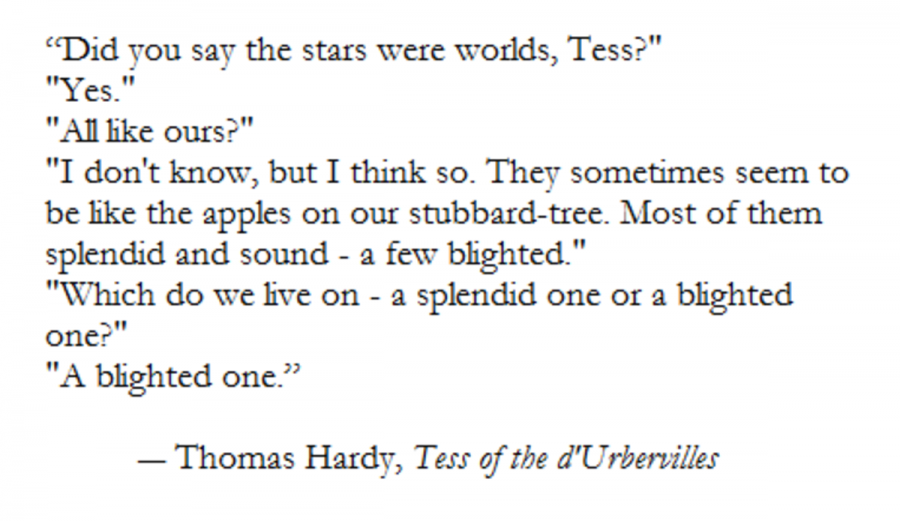By Elizabeth Grace ’15, Perspectives Co Section Editor and Claire Beyette ’15, Arts Section Editor
Some argue that the dreariness that settles over students in the winter months comes as a side-effect of freezing temperatures and frigid snow storms that prove harsh enough to be annoying but not enough to warrant snow days. Those people are probably partially right. But are the books we read in English classes during all four years of high school also to blame?
Starting freshman year, the majority of the assigned reading is, if not downright depressing, at least somewhat disconcerting. Great Expectations, despite its optimistic title, is not quite as cheerful as one might expect. Though the ending is somewhat bright, this comes only as a consequence of complaints that Dickens’s original ending was too depressing, forcing the author to change it to the conclusion now included in current editions (though the original, despite its gloom, was much better). Despite a happy conclusion, Great Expectations is neither happy nor uplifting. However, I must give a warning to the freshman: it gets much, much worse. Rounding off the year, The Odyssey (spoiler alert: there’s a lot of death and tribulations) and Romeo and Juliet (the first of many Shakespearean tragedies Country Day students must read) don’t exactly brighten up the mood.
Sophomore year may truly be the height of depressing literature at Country Day, so freshmen, good luck, and sophomores, look forward to the next two years (though they aren’t that much better, so don’t get too excited). The English department will try to trick you by assigning Pride and Prejudice first. Do not be fooled by its relative jauntiness. Delights such as Jane Eyre, Tess of the D’Urbervilles, Tale of Two Cities, Macbeth, and Frankenstein are still to come. While Thomas Hardy’s Tess of the D’Urbervilles may be the most depressing book in the combined curriculums of all of the English classes at Country Day, that does not lessen the bleak depression emitted from the others. Not only do these end in a way that may provoke some tears, but each passing page from cover to cover may prompt questions such as, “Is happiness a lie?” The only consolation, besides Pride and Prejudice, might be in A Tale of Two Cities; while there is certainly quite a bit of tragedy, the ending could be described as bittersweet instead of the usual bleak, despairing, or hopeless. (You might still cry, however. “Bittersweet” does not necessarily exclude “heartbreaking.”)
Junior year may seem just as depressing as sophomore year, but that may be the added stress of influences such as the junior paper and the commencement of the college search; the literature is less depressing than it was the year before. Phew. Don’t get too comfortable though. Only one novel on the curriculum may escape classification as dreary: The Adventures of Huckleberry Finn. While there may be some less-than-happy portions, the message as a whole is pretty uplifting and the end probably won’t prompt you to lock yourself in your room and sob. The Scarlet Letter, The Awakening, The Great Gatsby, and Of Mice and Men, on the other hand, will not let you off so easily. While I personally disliked the first two, and therefore endured more boredom and annoyance than sadness, there is no denying that they are not happy novels. The second two provide perfect pessimism for anyone who wanted still more depressing literature his or her life. If you desired further reminder of the unattainability of the American dream, look no further than The Great Gatsby or Of Mice and Men.
Finally, senior year. But don’t get too excited yet; while you spend what seems like forever on college applications, you’ll simultaneously enjoy novels such as The Road and Blindness. If these do not make you question the goodness of humanity, I don’t know what will. With every turn of a page, there is a new reason to make you hate the world and all that inhabits it. You may think I’m exaggerating. Okay, maybe I am a little, but not as much as you might think. As if these two novels weren’t enough, two more Shakespearean tragedies enter the mix: Hamlet and King Lear. The only thing that keeps senior year English from surpassing sophomore year English in terms of quantity of depressing literature is that the former is only a semester (though there are many depressing options in second semester electives as well). And, well, sophomore year include Tess of the D’Urbervilles, which is pretty hard to top.
Over the past four years, the novels and plays I have read in my English classes have been overwhelmingly depressing. Sure, there have been some additions such as Pride and Prejudice and The Adventures of Huckleberry Finn. They are not nearly happy enough, nor large enough a group, to counteract the pure darkness seeping from the pages of their opponents. I don’t know if I’ll ever recover from enduring The Road. To be clear, “depressing” does not exclude “good.” Despite their disheartening content, the majority are incredibly well-written and essential additions to any complete repertoire of classic literature. But shouldn’t there be some balance? Shouldn’t there be more novels in the Country Day curriculum that evoke happiness and convey more uplifting themes?
The six books on the list below represent the best of modern literature. They are uplifting stories of hardship and ultimate triumph that inspire the reader to pursue their dreams. While parts of the stories may be tragic, the overall tone is one of hope and promise. In addition to being gripping stories, these novels are all renowned for their literary qualities. They are taught at many high schools and colleges nationwide.
October Sky (also known by its anagram Rocket Boys) is a memoir which tells the story of a group of boys who dream of building rockets. After seeing Sputnik cross the sky above his town, Homer Hickam, a high school student, decides to launch his own rocket with the help of his friends and his chemistry teacher, Miss Riley. Set against the backdrop of Cold War life in a small coal mining town in West Virginia, the novel explores the pursuit of dreams, and what it means to be a community. October Sky won the W.D. Weatherford Award for literature the year it was published and is now one of the most popular community reads.
Plainsong (Kent Haruf) details the lives of a few of the residents in Holt Colorado. Prominent characters include Victoria, a pregnant teenager whose mother kicks her out; the McPheron brothers, the childless elderly bachelors who take her in; Tom Guthrie, a school teacher with a mentally unstable wife; and Maggie Jones, a woman with a mentally unstable father. Over the course of the novel, the stories of these individuals intertwine with a poetic elegance, matched only by the beautiful descriptions of life on the Great Plains. Often regarded as one of the most beautifully written books of the 20th century, Plainsong was a finalist for the National Book Award and received the Maria Thomas Award for fiction.
Seabiscuit (Laura Hillenbrand) is a nonfiction account of the renowned racehorse Seabiscuit. This uplifting story focuses on the three men who worked with the horse: the owner, Charles Howard; the trainer, Tom Smith; and “Red” the jockey. The four of them fight against their individual histories of loss, and, despite their disadvantages, turn into a winning team. Hillenbrand’s writing transcends the realm of nonfiction, earning Seabiscuit a place as an American Classic. Seabiscuit has won countless awards including the National Book Critics Circle Award, and is a New York Times Best Seller.
I Know Why the Caged Bird Sings is an autobiography written by renowned poet Maya Angelou. It begins when she, age three, moves to Arkansas to live with her grandmother, and ends when she, age sixteen, becomes a mother. Over the course of the novel, readers experience the transformation of a girl from a downtrodden victim of racism into a strong and dignified woman who would pen poems such as “Still I Rise”. Renowned as an autobiography that is also a piece to literature, I Know Why the Caged Bird Sings was nominated for a National Book Award and holds the title for the longest time a nonfiction book has spent on the New York Times Best Seller list.
The Help (Kathryn Stockett) is a poignantly comedic novel about a group of African-American Maids working in Mississippi during the 1960’s. The novel deals primarily with the theme of racism that was so prevalent in the Deep South during the 60’s. Despite this focus on social problems, the relationships between the women and the humor, in face of tragedy, with which they view their world set this book apart from other novels that deal with similar topics. The Help has sold over five million copies and spent more than 100 weeks on the New York Times Best Seller list.
Lonesome Dove (Larry McMurtry) is the story of two aging Texas Rangers who decide to drive a herd of cattle from the Mexican border to Montana. Over the course of the novel, they and their ranch hands face countless hardships and losses. Yet, despite the role that the violence of the Wild West plays in the story, it is a profoundly uplifting novel that speaks to the core of humanity. While the novel’s length makes it impractical to be assigned as school year reading, it could possible by assigned as optional summer reading (maybe as an alternative to reading two other books). Lonesome Dove won the Pulitzer Prize for Literature in 1985.






